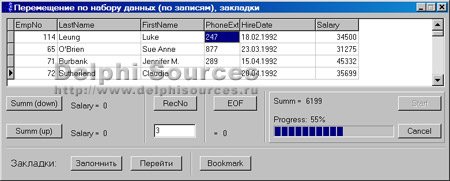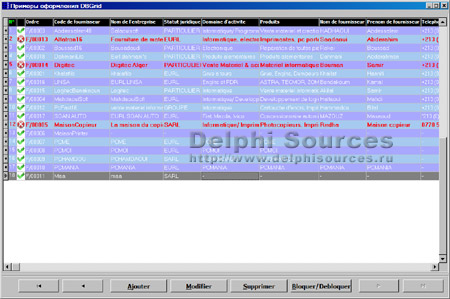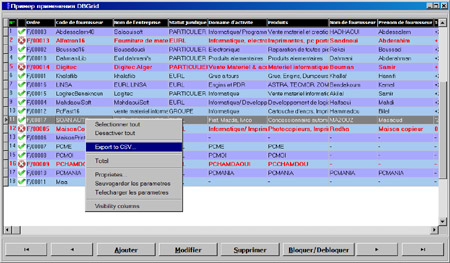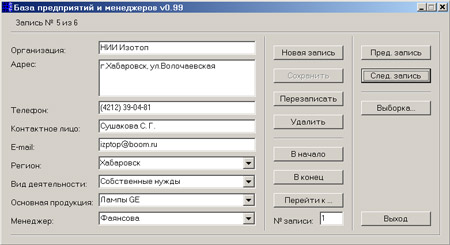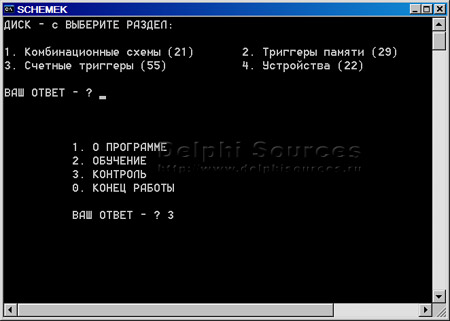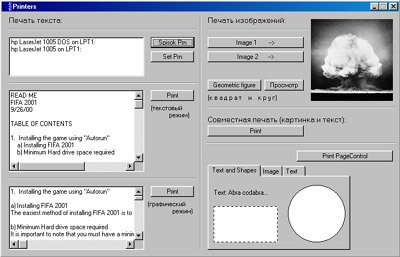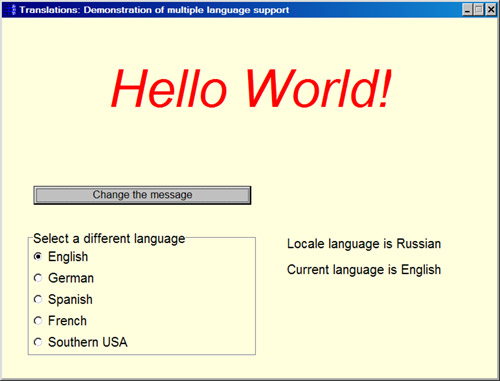Отключить клавиши при системном Hooke
Оформил: DeeCo
{
** What is a Hook? **
A hook is a point in the system message-handling mechanism where an
application can install a subroutine to monitor the message traffic in
the system and process certain types of messages before they reach the target window procedure.
To use the Windows hook mechanism, a program calls the SetWindowsHookEx() API function,
passing the address of a hook procedure that is notified when the specified
event takes place. SetWindowsHookEx() returns the address of the previously installed
hook procedure for the same event type. This address is important,
because hook procedures of the same type form a kind of chain.
Windows notifies the first procedure in the chain when an event occurs,
and each procedure is responsible for passing along the notification.
To do so, a hook procedure must call the CallNextHookEx() API function,
passing the previous hook procedure's address.
--> All system hooks must be located in a dynamic link library.
** The type of Hook used in this Example Code: **
The WH_GETMESSAGE hook enables an application to monitor/intercept messages
about to be returned by the GetMessage or PeekMessage function.
}
{
** Hook Dll - WINHOOK.dll **
WINHOOK.dpr
|-----WHookInt.pas
** Interface unit ** WHookDef.dpr
}
{********** Begin WHookDef.dpr **************}
{ Interface unit for use with WINHOOK.DLL }
unit WHookDef;
interface
uses
Windows;
function SetHook(WinHandle: HWND; MsgToSend: Integer): Boolean; stdcall;
function FreeHook: Boolean; stdcall;
implementation
function SetHook; external 'WINHOOK.DLL' Index 1;
function FreeHook; external 'WINHOOK.DLL' Index 2;
end.
{********** End WHookDef.dpr **************}
{********** Begin Winhook.dpr **************}
{ The project file }
{ WINHOOK.dll }
library Winhook;
uses
WHookInt in 'Whookint.pas';
exports
SetHook index 1,
FreeHook index 2;
end.
{********** End Winhook.dpr **************}
{********** Begin WHookInt.pas **************}
unit WHookInt;
interface
uses
Windows, Messages, SysUtils;
function SetHook(WinHandle: HWND; MsgToSend: Integer): Boolean; stdcall; export;
function FreeHook: Boolean; stdcall; export;
function MsgFilterFunc(Code: Integer; wParam, lParam: Longint): Longint stdcall; export;
implementation
// Memory map file stuff
{
The CreateFileMapping function creates unnamed file-mapping object
for the specified file.
}
function CreateMMF(Name: string; Size: Integer): THandle;
begin
Result := CreateFileMapping($FFFFFFFF, nil, PAGE_READWRITE, 0, Size, PChar(Name));
if Result <> 0 then
begin
if GetLastError = ERROR_ALREADY_EXISTS then
begin
CloseHandle(Result);
Result := 0;
end;
end;
end;
{ The OpenFileMapping function opens a named file-mapping object. }
function OpenMMF(Name: string): THandle;
begin
Result := OpenFileMapping(FILE_MAP_ALL_ACCESS, False, PChar(Name));
// The return value is an open handle to the specified file-mapping object.
end;
{
The MapViewOfFile function maps a view of a file into
the address space of the calling process.
}
function MapMMF(MMFHandle: THandle): Pointer;
begin
Result := MapViewOfFile(MMFHandle, FILE_MAP_ALL_ACCESS, 0, 0, 0);
end;
{
The UnmapViewOfFile function unmaps a mapped view of a file
from the calling process's address space.
}
function UnMapMMF(P: Pointer): Boolean;
begin
Result := UnmapViewOfFile(P);
end;
function CloseMMF(MMFHandle: THandle): Boolean;
begin
Result := CloseHandle(MMFHandle);
end;
// Actual hook stuff
type
TPMsg = ^TMsg;
const
VK_D = $44;
VK_E = $45;
VK_F = $46;
VK_M = $4D;
VK_R = $52;
MMFName = 'MsgFilterHookDemo';
type
PMMFData = ^TMMFData;
TMMFData = record
NextHook: HHOOK;
WinHandle: HWND;
MsgToSend: Integer;
end;
// global variables, only valid in the process which installs the hook.
var
MMFHandle: THandle;
MMFData: PMMFData;
function UnMapAndCloseMMF: Boolean;
begin
Result := False;
if UnMapMMF(MMFData) then
begin
MMFData := nil;
if CloseMMF(MMFHandle) then
begin
MMFHandle := 0;
Result := True;
end;
end;
end;
{
The SetWindowsHookEx function installs an application-defined
hook procedure into a hook chain.
WH_GETMESSAGE Installs a hook procedure that monitors messages
posted to a message queue.
For more information, see the GetMsgProc hook procedure.
}
function SetHook(WinHandle: HWND; MsgToSend: Integer): Boolean; stdcall;
begin
Result := False;
if (MMFData = nil) and (MMFHandle = 0) then
begin
MMFHandle := CreateMMF(MMFName, SizeOf(TMMFData));
if MMFHandle <> 0 then
begin
MMFData := MapMMF(MMFHandle);
if MMFData <> nil then
begin
MMFData.WinHandle := WinHandle;
MMFData.MsgToSend := MsgToSend;
MMFData.NextHook := SetWindowsHookEx(WH_GETMESSAGE, MsgFilterFunc, HInstance, 0);
if MMFData.NextHook = 0 then
UnMapAndCloseMMF
else
Result := True;
end
else
begin
CloseMMF(MMFHandle);
MMFHandle := 0;
end;
end;
end;
end;
{
The UnhookWindowsHookEx function removes the hook procedure installed
in a hook chain by the SetWindowsHookEx function.
}
function FreeHook: Boolean; stdcall;
begin
Result := False;
if (MMFData <> nil) and (MMFHandle <> 0) then
if UnHookWindowsHookEx(MMFData^.NextHook) then
Result := UnMapAndCloseMMF;
end;
(*
GetMsgProc(
nCode: Integer; {the hook code}
wParam: WPARAM; {message removal flag}
lParam: LPARAM {a pointer to a TMsg structure}
): LRESULT; {this function should always return zero}
{ See help on ==> GetMsgProc}
*)
function MsgFilterFunc(Code: Integer; wParam, lParam: Longint): Longint;
var
MMFHandle: THandle;
MMFData: PMMFData;
Kill: boolean;
begin
Result := 0;
MMFHandle := OpenMMF(MMFName);
if MMFHandle <> 0 then
begin
MMFData := MapMMF(MMFHandle);
if MMFData <> nil then
begin
if (Code < 0) or (wParam = PM_NOREMOVE) then
{
The CallNextHookEx function passes the hook information to the
next hook procedure in the current hook chain.
}
Result := CallNextHookEx(MMFData.NextHook, Code, wParam, lParam)
else
begin
Kill := False;
{ Examples }
with TMsg(Pointer(lParam)^) do
begin
// Kill Numbers
if (wParam >= 48) and (wParam <= 57) then Kill := True;
// Kill Tabulator
if (wParam = VK_TAB) then Kill := True;
end;
{ Example to disable all the start-Key combinations }
case TPMsg(lParam)^.message of
WM_SYSCOMMAND: // The Win Start Key (or Ctrl+ESC)
if TPMsg(lParam)^.wParam = SC_TASKLIST then Kill := True;
WM_HOTKEY:
case ((TPMsg(lParam)^.lParam and $00FF0000) shr 16) of
VK_D, // Win+D ==> Desktop
VK_E, // Win+E ==> Explorer
VK_F, // Win+F+(Ctrl) ==> Find:All (and Find: Computer)
VK_M, // Win+M ==> Minimize all
VK_R, // Win+R ==> Run program.
VK_F1, // Win+F1 ==> Windows Help
VK_PAUSE: // Win+Pause ==> Windows system properties
Kill := True;
end;
end;
if Kill then TPMsg(lParam)^.message := WM_NULL;
Result := CallNextHookEx(MMFData.NextHook, Code, wParam, lParam)
end;
UnMapMMF(MMFData);
end;
CloseMMF(MMFHandle);
end;
end;
initialization
begin
MMFHandle := 0;
MMFData := nil;
end;
finalization
FreeHook;
end.
{********** End WHookInt.pas **************}
{ *******************************************}
{ ***************** Demo ******************}
{ *******************************************}
{
** HostApp.Exe **
HostApp.dpr
|-----FrmMainU.pas
}
{********** Begin HostApp.dpr **************}
{ Project file }
program HostApp;
uses
Forms,
FrmMainU in 'FrmMainU.pas' {FrmMain};
{$R *.RES}
begin
Application.Initialize;
Application.CreateForm(TFrmMain, FrmMain);
Application.Run;
end.
{********** End HostApp.dpr **************}
{********** Begin FrmMainU.pas **************}
unit FrmMainU;
interface
uses
Windows, Messages, SysUtils, Classes, Graphics, Controls, Forms, Dialogs,
StdCtrls, ExtCtrls;
const
HookDemo = 'WINHOOK.dll';
const
WM_HOOKCREATE = WM_USER + 300;
type
TFrmMain = class(TForm)
Panel1: TPanel;
BtnSetHook: TButton;
BtnClearHook: TButton;
procedure BtnSetHookClick(Sender: TObject);
procedure BtnClearHookClick(Sender: TObject);
procedure FormCreate(Sender: TObject);
private
FHookSet: Boolean;
procedure EnableButtons;
public
end;
var
FrmMain: TFrmMain;
function SetHook(WinHandle: HWND; MsgToSend: Integer): Boolean; stdcall;
external HookDemo;
function FreeHook: Boolean; stdcall; external HookDemo;
implementation
{$R *.DFM}
procedure TFrmMain.EnableButtons;
begin
BtnSetHook.Enabled := not FHookSet;
BtnClearHook.Enabled := FHookSet;
end;
// Start the Hook
procedure TFrmMain.BtnSetHookClick(Sender: TObject);
begin
FHookSet := LongBool(SetHook(Handle, WM_HOOKCREATE));
EnableButtons;
end;
// Stop the Hook
procedure TFrmMain.BtnClearHookClick(Sender: TObject);
begin
FHookSet := FreeHook;
EnableButtons;
BtnClearHook.Enabled := False;
end;
procedure TFrmMain.FormCreate(Sender: TObject);
begin
EnableButtons;
end;
end.
{********** End FrmMainU.pas **************}
|
